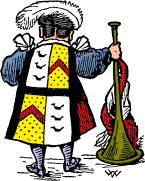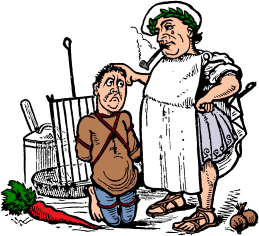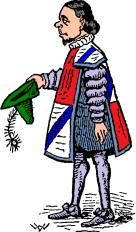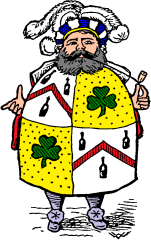HOME
Preface
Introduction
1
2
3
4
5
6
7
8
9
10
11
12
13
14
15
16
17
18
19
20
21
22
23
II
CHAPTER II.
OF THE HERALDS.
AVING seen how Heraldry arose, it behoves us, before we consider the Heraldic ollapodrida itself, to say a few words of the cooks who were the chief compounders of the mixture. These were the Heralds.
The word Herald is said to be derived from two German words "Herr alt"--"Aged sir"--and originally they were veteran soldiers who, pensioners not being invented in those days, were appointed to carry messages, do odd jobs, and make themselves generally useful. In fact, if this explanation be true, they were prototypes of our modern commissionaires.
Amongst the Greeks the Heralds' duties were even less dignified, for Homer describes Talthybius as filling up his spare time with a little plain cooking. Cooking in those days was exceedingly plain. Likewise they prepared the victim, human and otherwise, it was all one to those eminent heathens, for the religious sacrifices, doubtless consoling them by comforting observations such as "It's nothing when you're used to it"--"It won't hurt much"--or, "It will be all the same a hundred years hence," and similar verbal panacea so often applied by persons who do not suffer to those who do.
Amongst the Romans the Heralds(Fetiales as they were called) had decidedly a better time of it, and had risen considerably in the world. They had a college, and were evidently as great creatures in their way as were their mediæval successors. Livy mentions them as officiating extensively in that celebrated prize-fight between the Horatii and Curiatii, B.C. 667 : though whether they held the sponges, or the bottles, or kept the crowd in order, seeing that the roughs in the back seats did not get into the front ones without paying, is not mentioned with that accuracy which the ardent student of the science could have desired.
The Fetiales also declared war, which they did in a very fantastic manner. They proceeded to the hostile country wearing a wreath of wool on their heads, partly, probably, for warmth, as the nights might be cold and travelling slow, and partly as one of the insignia of their office. Having arrived at the frontier, the Herald cast a spear into the enemy's country, or, if he did not happen to have one about him, a staff dipped in blood and burnt at one end did just as well, and then everybody looked out for squalls, and the assurance offices of the period immediately raised their premiums on military lives to the doubly hazardous war risk elevation with a promptitude that charmed their most grasping shareholders.
To come down, however, to more modern ages : Richard II., who came to a mysterious but decidedly bad end in Pomfret Castle some time in the year A.D. 1400, first laid the foundation of the Heralds' College by giving the Earl Marshal power to preside in the Court of Chivalry, and to summon the Heralds to his assistance. Of course they came. They saw their opportunity, and jumped at the chance, and probably had what the Americans call "a real good time." They acted as barristers, though whether they took fees for attending cases and then never came near the place, because they had something better to do, is not stated. Such advanced manners and customs are not unlikely to be the products of our modern civilisation.
The first regular collegiate chapter of the Heralds was held in A.D. 1420, at Rouen, and after that they became a corporate body. Then Heraldry began to look up, and the Heralds finding how good a thing it was, made a very close borough of it indeed. They thoroughly appreciated the virtue of keeping a good thing in the family--and did so.
Many and various were their duties: they had to regulate armorial bearings, that is, to see that nobody took anybody else's arms--which sounds uncomfortable, or as if people, like the late Miss Biffin, were born without them--to marshal processions--a duty now relegated to the police; to superintend ceremonies--also performed now-a-days, more or less efficiently, by Sir Edmund Henderson's myrmidons; to see that trials by battle were conducted with a due regard to the comfort and convenience of the combatants; [N.B.--In those happy times no one ever gave the "office" to the authorities with the view of stopping a "merry mill;"] to arrange tournaments, those excessively violent sports where the knights were in the habit of killing one another just for the fun of the thing; and, finally, to bear messages of courtesy and defiance between royal personages and knights.
As this latter duty might under ordinary circumstances have proved a most awkward one, especially if the receiver of an unpleasant message happened to be of a choleric temperament, by common consent the persons of the Heralds were declared inviolable. This of course made matters comparatively comfortable for them, and they were thus enabled to deliver the rudest, not to say insulting, personal messages without any fear of the "Away-with-him-to-the-lowest dungeon-beneath-the-moat" answer being given to them, or even of being kicked.
The Heralds also recorded the valiant acts of those who were killed in, and those who survived great battles, and thus proved extremely valuable to persons whose trumpets wanted blowing.
Another duty of the Heralds was to shout "Largesse !" whenever they thought there was a chance of anybody giving them anything, which apparently corresponded to the modern custom which prevails with the small boys who run by the side of omnibuses, turning cart-wheels to incite the generosity of city gents to "chuck us down a copper." Not that the Heralds did either ground or lofty tumbling; that was always left to the regular fool, of which each family then, as now, had always one.
Besides these duties, they had the right of picking up the gold and silver chipped off the armour of the knights in tournaments, a perquisite of sterling value, considering that the combatants were oftentimes got up as regardless of expense as a spectacle piece at Drury Lane.
Also, the Heralds once in every generation, or at intervals of from twenty-five to forty years, had to make visitations or progresses through the country to see that nobody had been playing tricks with anybody's arms; when woe to the delinquent if discovered, pepper of the warmest description being provided by the Heralds for his especial delectation.
In the provincial towns, the Heralds were ordered by the Earl Marshal's warrant to enquire into the pedigrees of all families claiming the honour of gentry, and to enter their names, titles, and places of abode in a book. This custom only commenced regularly in 1528, when the monks in England who had previously been the chief keepers of genealogical facts retired from business generally in consequence of events not altogether unconnected with Henry VIII., Anna Boleyn, Queen Catherine, Cardinal Wolsey, the Pope, Luther, the Reformation, and other circumstances of a similar nature. Then, in order to prevent genealogies, arms, titles &c., becoming irretrievably mixed, these visitations were ordered, and the Heralds were appointed the sorters of the period.
Previously to the Reformation these progresses had now and then been made, and they were continued from the date above given until the reign of William and Mary. They were relinquished, however, in consequence of the large amount of envy, hatred, malice, and all uncharitableness they excited in the various counties visited; arms granted on these occasions being frequently found to be blazoned with bones of contention, and genealogical trees to produce apples of discord.
And now we come to the Heralds' College, a building situated at the present day in Queen Victoria Street, which is (the college not the street) the head-quarters of Heraldry, and where the Duke of Norfolk, the Earl Marshal of England, is the grand lama of the science. After him, longo intervallo, come the Heralds, of whose manners, customs, rights, privileges and distinctions we will now discourse cheerfully but accurately.
Of Heralds there are three kinds: first, there are the Kings at Arms, who may be called the big boys of the school, or Heralds' College, and who are very extensive persons indeed. In England Garter King of Arms holds the highest rank. He was created to attend upon the Knights of the Garter, and originally we may suppose he had to provide and see to the fit of the article from which he takes his name. The distinguishing colour of Garter is blue, a colour he invariably assumed when he caught anyone transgressing the rules of the college over which he presided.
Garter must be an Englishman and a gentleman, words unhappily not always synonymous.
The next king at arms is Clarencieux, who was ordained by King Edward IV. upon his succession to the dukedom of Clarence at the death of his brother, whose bibulous proclivities caused him to seek his bier in a butt of Malmsey. The story goes that Edward, doubtless wishing to do the liberal thing by his relation, offered him his choice of deaths, and that Clarence elected to be drowned in the above liquor, which was privately done in the Tower. To our thinking the whole affair has about it considerably more of the public than the private.
Clarencieux's colour is purple, a delicate allusion to the juice of the grape, and he is the Heraldic authority on all questions in the English counties south of Trent.
After him comes Norroy, whose colour is also purple, and his authority extends over all the counties north of Trent.
Besides these kings there is also a Bath King of Arms, but as he does not belong to the Heraldic College, he may retire to the place whence he takes his name. He is quite a modern creation, having come into existence only in 1725, for the service of the Knights of the Bath, when his duties probably are to see to the temperature of the water, and the presence of the necessary towels.
Next come the Heralds, who are six in number. Their names are Somerset, Chester, Windsor, Richmond, Lancaster and York, and they are supposed to be officially connected with the districts after which they are named. Properly speaking, therefore, whenever a fight comes off in any of the above named towns, the Herald of the place ought to be present to prevent the police from interfering. But now-a-days they neglect their duty sadly in this particular : not that we are altogether surprised, considering the exceedingly low ebb to which the "noble art" has sunk, and Heralds doubtless have with unheraldic persons an equal objection to blackened eyes, bad language and stolen watches.
Last of all come the Pursuivants or Novitiates, who are the lower boys of the science. Their names are fanciful, not to say comic. Rouge Dragon, which, translated into English, would seem to smack more of the public-house than the college; Portcullis, who, if his nature takes after his denomination, must often have been lowered in the eyes of the world; Blue Mantle, let us hope his mantle wasn't used to cover the mistakes he made; and Rouge Croix, who probably was the original bearer of the red cross banner we read of in the song of that name.
Scotland had only one King at Arms, Lyon, but an equal number of Heralds with England. Their names were Snowdon, Albany, Ross, Rothesay, Marchmont and Islay; the last-mentioned, among his other duties, having probably to provide his brethren with the celebrated whisky of that ilk. Scotland had one more Pursuivant than her southern neighbour,--viz., five.
These Caledonian Pursuivants rejoice in the appellations of Unicorn, (evidently the original animal who contended for the crown unsuccessfully, and after his defeat retired in disgust to a more northern country, where, to console him, he was made a Pursuivant), Carrick, Kintyre, Ormond and Bute.
Ireland has only one King at Arms, Ulster; and only two Heralds, Dublin and Cork; also only two Pursuivants, Athlone and St. Patrick. The scantiness of the Hibernian Heraldic supply, is another instance of injustice to Ireland.
"What ho!" O'Gorman to the rescue!
II
1
2
3
4
5
6
7
8
9
10
11
12
13
14
15
16
17
18
19
20
21
22
23
Preface
Introduction
HOME
Build: 2019/04/20 14:20:08.59+0900(JST)





